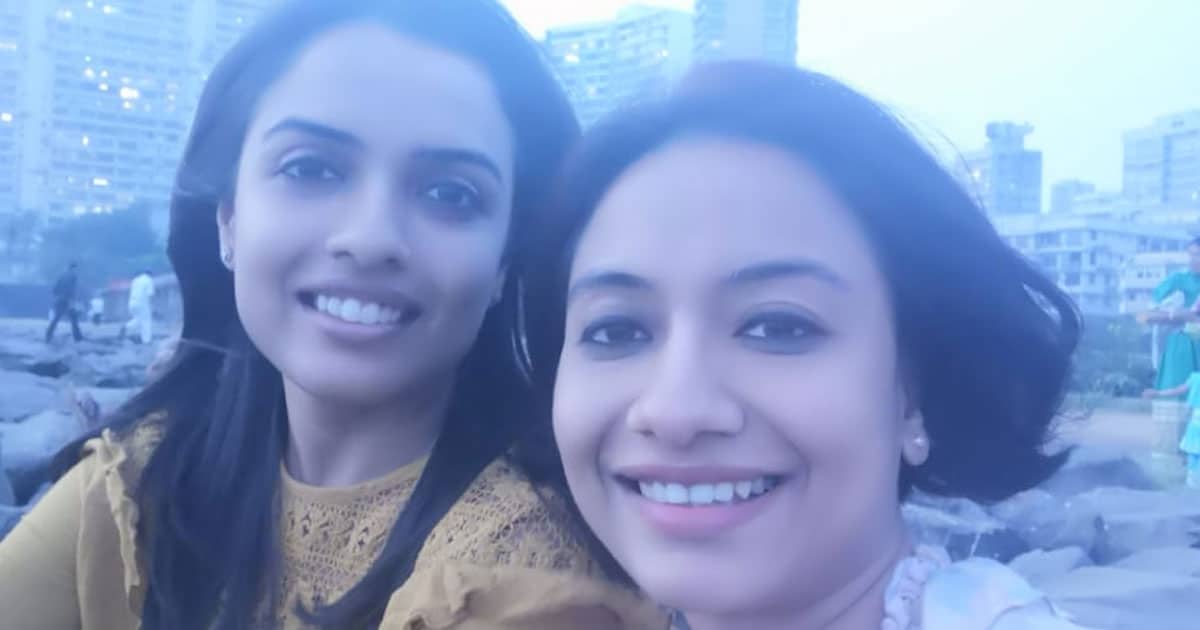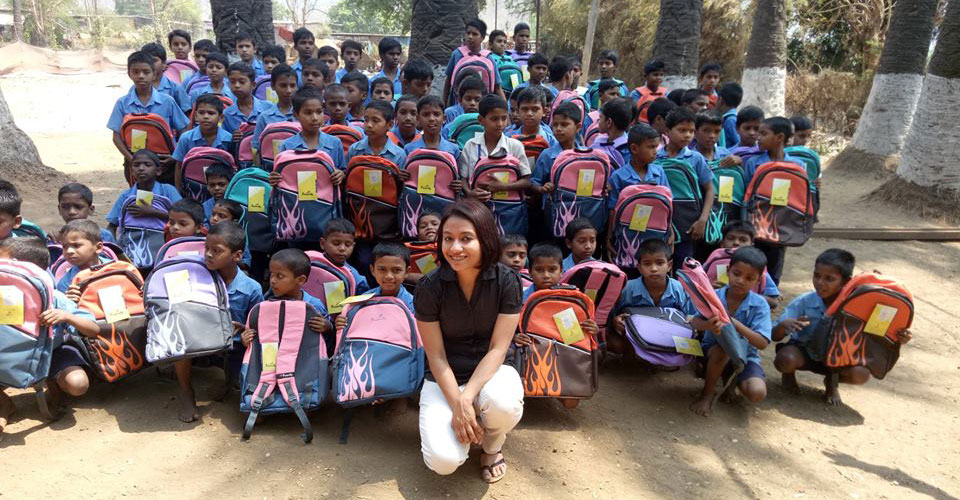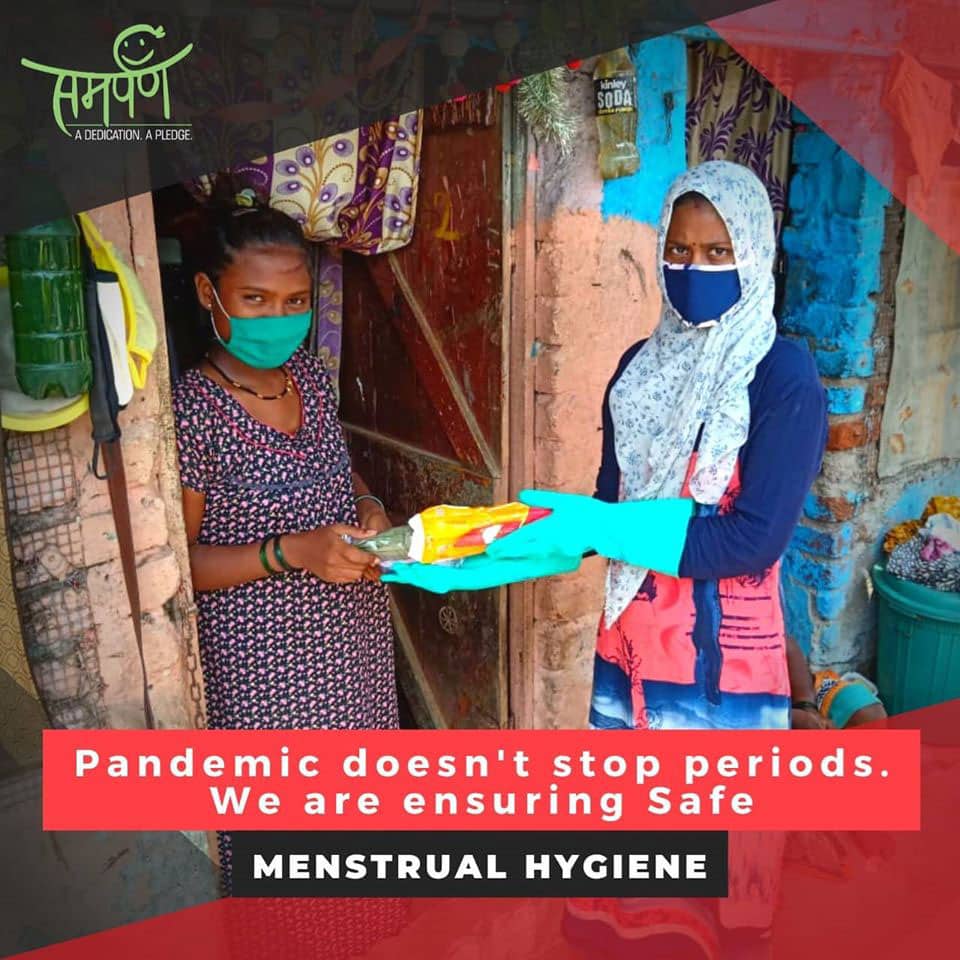This sister duo of Dr. Ruma Bhargava and Dr. Megha Bhargava has not only touched the lives of around 10,500 children in 41 schools in rural India within just 4 years but also worked inexorably during the Covid-19 lockdown, distributing around 2.5 million meals to the impoverished.
Despite the early life hardships, hailing from the small town of Kota, Rajasthan, they not only made it to the big cities in pursuance of academic excellence but also went on to achieving bigger exposures thereafter.
“Our parents never compromised on our education, despite it being quite unusual back then to send small-town girls, especially from Rajasthan, to big cities for pursuing academics”, Dr. Ruma Bhargava could not thank her Kota-based parents enough.
Post dentistry, Megha became a bureaucrat after clearing UPSC and currently serving as the Deputy Commissioner Income Tax in Mumbai. Ruma pursued her degrees in Public Health and management from Delhi and Singapore, respectively, and is now working with the International Federation of Red Cross addressing global health challenges.

“I am more experienced in the domain of development and my sister is well-versed in the nuances of government functioning. It is kind of complementing each other with our respective experiences towards a common goal,” Dr.Ruma Bhargava proudly says.
In an exclusive conversation with LifeBeyondNumbers, Dr.Ruma shared more about Samarpan- its vision, achievements, and the way forward.
Samarpan – The Begining
Even after being well-settled in their respective careers, they both were not ready to settle with their personal comforts and wanted to bring changes at the grass-root level. Connected to the medical field, the sister-duo utilized the synergism between the two in order to complement each other in the smooth functioning of the organization as Ruma founded Samarpan in the year 2016, and Megha joined in as its adviser.
“Despite pursuing comfortable careers, we realized that the grass-root work is somehow missing. That is when we thought we should start something of our own and give our thoughts and ideas a structured form,” Ruma explains the motivation behind Samarpan.
As they visited several schools in the remote locations of Rajasthan’s Kota, Maharashtra’s Dahanu tribal area of Palghar district, and Uttarakhand, they learned about the abysmal condition of education and health facilities as far as the government schools were concerned. Even the basic skills of reading, writing, and arithmetic were inadequate among the children of these government schools.
“After talking to several teachers, students, and parents of these schools, we could zero down the basic factors hindering the process of imparting good quality education. Despite high enrolment rates in these schools, many among these students are prone to dropping out. We worked out on these statistics after going to these villages. We realized the dire need of pushing a comprehensive program addressing all these hurdles in the domain of education and health in schools through an organization,” Ruma narrates about the genesis of Samarpan.
On-Ground Impact
It was noted that due to lack of hygiene awareness, access, and arrangements, students tend to drop out of schools at a higher rate. “Under the organization’s School Health Program, it is ensured that quality and accessible healthcare is provided to the students,” said Dr. Megha.
Also read:
How A Simple Initiative By This 28-YO Girl Is Reducing The School Dropout Rate In Varanasi
The program, that aims at tackling the appalling health statistics in the rural schools of the country, includes:
- Installing clean drinking water facilities to prevent common water-borne diseases that result in regular absenteeism in schools: Samarpan has installed water purifiers in 41 Govt schools in rural areas of Rajasthan, Uttarakhand, and Maharasthra providing access to clean drinking water to 7,365 children.
- Instilling safe WASH (Water, sanitation, and hygiene) practices among students
- Empowering female students with menstrual hygiene products that are inaccessible to them: Bio-degradable sanitary napkins were provided and menstrual hygiene workshops were held in the tribal schools and colleges impacting 596 adolescents girls.
- Improving students’ nutritional status that rendered inadequate despite the nominal mid-day meal arrangements
- Arranging primary healthcare camps in these schools for prevention and cure of common ailments: Diagnostic and treatment camps have been conducted to provide primary healthcare to 974 students in these government schools.
Besides, Samarpan also aims at creating an enabling environment in the schools by upgrading the school’s educational infrastructure. Thus, it has been providing the children with the ‘Adhyayan Kits’ which cater to their basic educational necessities.

“Around 1800 Adhyayan kits have been distributed in the rural schools to aid the basic education needs of the children in these schools by providing them with school bags, stationery kits, colors, notebooks, and school uniforms and sweaters,” Dr. Megha elatedly tells LifeBeyondNumbers.
Samarpan has also provided solar lanterns to 65 families in Rajasthan’s non-electrified Kolipura village.
Challenges Faced
Currently, Samarpan constitutes an amorphous group with the association of like-minded people from various backgrounds including medical professionals, chartered accountants, and bureaucrats, and have student-volunteers working with it. But it was not as smooth-sailing since the beginning.
Though at present the organization is adequately funded through CSR (Corporate Social Responsibility), donations and crowd-funding, resources have been a big challenge at the beginning. “As soon as we started making an impact, resources started pouring in,” Dr. Bhargava says optimistically.
A similar challenge applies in terms of human resources as well. “Initially, it was difficult to gather volunteers but as we progressed and people came to know about our work, a lot of people came to support us,” she adds.
Efforts During The Covid-19 Lockdown
Being experienced in the field of medicine, they were quick to gauge the imminent threat of Covid-19 in the upcoming days and they took no time to start working towards the prevention of the contagion.
“We started working for Covid even before the lockdown started. We realized that the essential service providers around us were at a higher risk of infection owing to their daily commute by public transport and congested areas of living. So, we started distributing safety essentials like soaps, masks, and sanitizers among them on an urgent basis,” Ruma explains.
Soon, after the lockdown was imposed, they received a few distress calls from several areas of Mumbai with people narrating them stories of living on biscuits for several days after the lockdown. This shook them enormously.
“We received a frantic call from Mumbai’s Bhindibazar area where 22 Bengali migrants were thriving upon biscuits for days. We started receiving support from the bureaucratic corners and collaborated with the Mumbai police and the civic bodies to arrange for immediate reliefs for these people,” says Ruma.
Despite having specific focus areas of education and health, they deemed it fit to channelize all their energies into providing reliefs for stranded migrant workers and people in distress across 7-cities of the country amid the need of the hour.
Samarpan distributed 28,700 Food Kits (equivalent to 19,41,165 meals) comprising of Flour, Rice, Pulses, Oil, Sugar, Vegetables, spices to the migrant workers, and daily wagers. Around 5.57 lakh cooked meals were provided to the homeless. Apart from these, 35,700 packets of milk powder, 2,00,000 nutrition bars, and 5,612 kgs of fruits and vegetables were distributed to ensure a nutritious diet to the people.
56,470 hand sanitizers, 1,58,000 face masks, 57,000 soaps, and 3500 pairs of gloves were distributed for personal hygiene. The organization reached out to 25,000 women in slums and containment areas and distributed bio-degradable sanitary napkins among them.
Also read:
Every Month, This Pad Couple Distributes Underwear And Sanitary Pads To 10,000+ Needy Children
In collaboration with an organization called Khana Chahiye, they distributed sanitation kits (hand sanitizers, soap, face mask, and water bottle) for at least 20 Shramik Trains that were departing from Mumbai and were about to make a journey of 9 hours at least on an average.
The impact of Samarpan’s COVID-19 efforts wouldn’t have been possible without the humane support of Mr. Suresh Kataria, Deputy Commissioner, Income Tax. He has been a constant driving force that kept the team going during the tough times.

The Road Ahead
With the easing of the lockdown and returning to the ‘new normal’, Samarpan has decided to support the livelihood efforts during these testing times. “We have the short-term goal of rehabilitating people who have lost their jobs during the lockdown with livelihood support,” Ruma mentions.
Through its ‘Rebuilding Lives’ project, Samarpan is reaching out to the women Self Help Groups (SHGs) to augment their sources of income and support their families. Nightingale Federation and Mahila Bachat Gat are among these SHGs comprising of 10 women running a Reusable Sanitary Napkin Production Unit in the Changlang district of Arunachal Pradesh and 8 women in Mumbai involved in tailoring activity, respectively.
For capacity augmentation of the Nightingale Federation production unit, the SHG is being provided with the machinery and raw materials for the production of reusable sanitary napkins. Besides, the organization is also facilitating the marketing of these products in collaboration with the District Administration of Changlang. Samarpan is purchasing face masks from Mahila Bachat Gat and distributing the same among the needy.
But these efforts in no way is shifting the primary focus on health and education. As soon as the schools open in the upcoming months, there are going to be way more obstacles than before including dwindling enrolment rates and dropouts due to children having to bear the brunt of the economic suffering of the family, especially girls.
“We would like to reintegrate our focus on education with the ‘Rebuilding lives’ project. We want to be ready to tackle such a situation as soon as the schools reopen. We are already in collaboration with the government of Rajasthan and hope to be able to reach as many schools as possible with the resources available to us,” Dr. Bhargava says resolutely.
With their clear sense of purpose, a visionary insight, an indomitable spirit, and zest to serve the last mile of the society, the sister-duo has worked relentlessly to make the impact sustainable at the lowest rung of the socio-economic ladder.
“We are in a privileged position of being able to give back to society. This is an opportunity that very few people get in their lives. We cannot change the whole world but even if we can make a difference by bringing smiles to a few faces, that means a lot,” Ruma says delightfully.
Click here to support their cause and bring that smile back to a thousand other lives.
All the story of this sister-duo tells us is that it is never too late to begin. Even if one starts small and grows up into touching a few lives, it can be immensely satisfying and bears the potential to inspire many.
The team LifeBeyondNumbers wishes them the best for all their upcoming ventures into changing lives!

